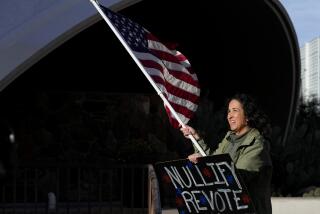Jeb Bush Testifies on Hands-Off Role in Election
- Share via
TALLAHASSEE, Fla. — Gov. Jeb Bush told the U.S. Commission on Civil Rights on Thursday that he took no special measures to ensure that the Florida election was conducted properly, even though he was aware of predictions that the presidential race here would be close and that minority voter turnout was expected to be high.
Bush, the brother of President-elect George W. Bush, told the panel that as governor “my duties are to certify the election” and exercise “a moral authority to see that the laws--state and federal laws--are upheld.” Elections, he said, are the responsibility of the secretary of State and the election supervisors in each of the state’s 67 counties.
Bush’s assertion that he had little reason or authority to make special provisions in advance of the election drew questions from several panel members, who seemed puzzled by the governor’s comments.
“He never said, ‘I wonder what’s going to happen on election day?’ He was caught completely off balance, by surprise?” asked Mary Frances Berry, chairwoman of the panel investigating allegations of voting irregularities in the state during November’s presidential election. “I was surprised that he came and testified that he had no responsibility.”
Bush testified during the first of two days of public hearings here; they were prompted by widespread reports that many voters, especially minorities, were denied their right to vote because of intimidation, faulty election equipment, untrained poll workers or a lack of information in languages other than English.
Berry asked the Florida governor whether he had had any advance conversations with his brother about the heavy registration of minority voters or the turnout expected on election day, and Bush said no.
The governor also said he had no preelection conversations with Secretary of State Katherine Harris, who also served as chairwoman of the George W. Bush campaign in Florida and who eventually certified the vote that gave the Texas governor the victory over Vice President Al Gore. Bush noted that because of his brother’s candidacy, he recused himself after the election as chairman of the state canvassing board.
After the election, Bush said he did ask Florida Atty. Gen. Bob Butterworth to investigate reports that police had set up roadblocks near African American neighborhoods in north Florida on election day. The governor also asked state law-enforcement officers to brief him on newspaper reports that convicted felons ineligible to vote had cast ballots.
But Bush said he did not consider ordering a state investigation to determine whether there was a pattern of intimidation or discrimination directed at minority voters. In an interview with reporters last week, Bush said he did not believe “there was any concerted effort to take away people’s right to vote.”
Bush has appointed a 21-member bipartisan task force to look into ways to improve the state’s voting system, but that panel--which held two days of hearings earlier this week--is expected to concentrate on the mechanics of the voting system. That task force, as well as Bush, already have endorsed doing away with the punch-card vote-counting machines blamed for much of the 45 days of recounts and uncertainty that followed the Nov. 7 vote.
The Civil Right Commission hearings opened a day after a coalition of civil rights groups filed a lawsuit in Miami, accusing Florida election officials with institutional racism that denied many African Americans their right to vote in the presidential election. Defendants include Jeb Bush and Harris.
The National Assn. for the Advancement of Colored People and several other plaintiffs have asked a federal judge to overhaul Florida’s election system by banning punch-card ballots used in 25 counties and ordering federal monitoring of state elections for 10 years.
During the Florida recounts, punch-card ballots were the subject of controversy as election officials struggled to determine voter intent when chads, or small bits of paper, were not completely detached from ballots.
The lawsuit does not attempt to overturn the results of the presidential race in Florida.
The civil rights commission’s inquiry also won’t affect the election. The panel will forward its findings and recommendations to the White House and Congress.
On Thursday, three African American voters testified before the panel and described what they considered intimidation. Roberta Tucker, 49, a state employee in Tallahassee, said she was stopped on the way to the polls by a Florida Highway Patrol traffic check. “I was intimidated by it; it was suspicious to me,” said Tucker, who was not ticketed.
After an internal investigation, Highway Patrol officials said the checkpoint was unauthorized by department officials, but they denied it was set up to scare anyone away from the polls.
The Rev. Willie D. Whiting, 50, said he was mistakenly told by a poll worker that he was ineligible to vote because his name was on a list of convicted felons. “I was slingshotted into slavery,” said Whiting of Tallahassee. “That’s how I felt.”
And Jefferson County resident John Nelson, 52, said he was unnerved on election day by the sight of Highway Patrol cars parked near the polls in places where he had never seen them before.
“We have not concluded that there was any kind of conspiracy,” said Berry, a professor of history at the University of Pennsylvania. “But we are hearing that some bad things happened.”
The civil rights commission also will hold public hearings in Fort Lauderdale, Orlando and Jacksonville before issuing an interim report within a few months.
Also testifying were experts on voting demographics and the problems faced by minorities and citizens who do not speak English. Expected before the panel today are officials of the Florida Highway Patrol, local election supervisors and Harris.
More to Read
Sign up for Essential California
The most important California stories and recommendations in your inbox every morning.
You may occasionally receive promotional content from the Los Angeles Times.













